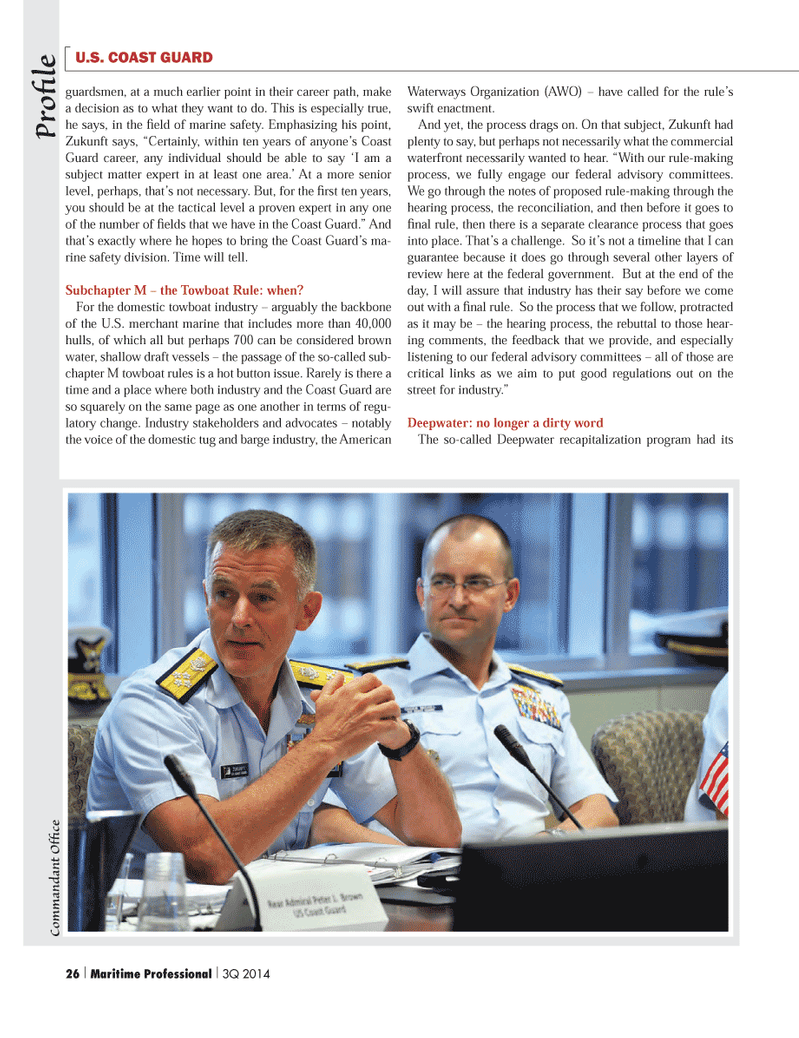
Page 26: of Maritime Logistics Professional Magazine (Q3 2014)
Power & Fuel Management
Read this page in Pdf, Flash or Html5 edition of Q3 2014 Maritime Logistics Professional Magazine
guardsmen, at a much earlier point in their career path, make a decision as to what they want to do. This is especially true, he says, in the Þ eld of marine safety. Emphasizing his point, Zukunft says, ÒCertainly, within ten years of anyoneÕs Coast Guard career, any individual should be able to say ÔI am a subject matter expert in at least one area.Õ At a more senior level, perhaps, thatÕs not necessary. But, for the Þ rst ten years, you should be at the tactical level a proven expert in any one of the number of Þ elds that we have in the Coast Guard.Ó And thatÕs exactly where he hopes to bring the Coast GuardÕs ma- rine safety division. Time will tell. Subchapter M ? the Towboat Rule: when? For the domestic towboat industry Ð arguably the backbone of the U.S. merchant marine that includes more than 40,000 hulls, of which all but perhaps 700 can be considered brown water, shallow draft vessels Ð the passage of the so-called sub- chapter M towboat rules is a hot button issue. Rarely is there a time and a place where both industry and the Coast Guard are so squarely on the same page as one another in terms of regu- latory change. Industry stakeholders and advocates Ð notably the voice of the domestic tug and barge industry, the American Waterways Organization (AWO) Ð have called for the ruleÕs swift enactment.And yet, the process drags on. On that subject, Zukunft had plenty to say, but perhaps not necessarily what the commercial waterfront necessarily wanted to hear. ÒWith our rule-making process, we fully engage our federal advisory committees. We go through the notes of proposed rule-making through the hearing process, the reconciliation, and then before it goes to Þ nal rule, then there is a separate clearance process that goes into place. ThatÕs a challenge. So itÕs not a timeline that I can guarantee because it does go through several other layers of review here at the federal government. But at the end of the day, I will assure that industry has their say before we come out with a Þ nal rule. So the process that we follow, protracted as it may be Ð the hearing process, the rebuttal to those hear- ing comments, the feedback that we provide, and especially listening to our federal advisory committees Ð all of those are critical links as we aim to put good regulations out on the street for industry.Ó Deepwater: no longer a dirty word The so-called Deepwater recapitalization program had its U.S. COAST GUARD ProÞ leCommandant OfÞ ce 26 | Maritime Professional | 3Q 201418-33 Q3 MP2014.indd 2618-33 Q3 MP2014.indd 268/13/2014 3:35:29 PM8/13/2014 3:35:29 PM

 25
25

 27
27
